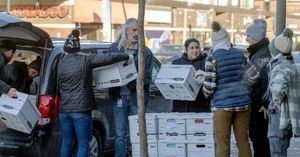Samuel Kangethe spent his last hours in the United States surrounded by the chaos of five overstuffed suitcases, finance textbooks, and the bittersweet laughter of friends gathered for an unexpected farewell. For 16 years, Kangethe called America home, building a life in Lansing, Michigan, with his wife Latavia and their three children: Dwight, 13, Hailey, 11, and Ella, 5. But on August 17, 2025, he walked through the doors of Detroit Metro Airport, leaving behind not only his belongings, but the family and future he had worked so hard to create.
“For me it has been an absolute privilege to be in this country, like (an) absolute privilege,” Kangethe told NPR, reflecting on a journey that began with a student visa and ended with a voluntary departure after a long and tangled immigration dispute. His voice, equal parts gratitude and heartbreak, echoed the feelings of countless immigrants whose lives are upended by shifting legal sands.
Kangethe’s immigration troubles began in 2014, when U.S. authorities accused him of entering a fraudulent marriage. He has no criminal record and maintains that he submitted ample evidence to contest the claim. “I have committed no crimes,” he insisted. But the case, like so many others, was swept into the bureaucratic backlog exacerbated by the COVID-19 pandemic. The court removed his case from its docket, only to reschedule it for January 2026, leaving Kangethe in a legal limbo with no clear resolution in sight.
The uncertainty gnawed at him. Without a ruling from an immigration judge, Kangethe knew that Immigration and Customs Enforcement (ICE) could detain him at any moment. “Deportation is the worst thing that would come out of this case,” he told NPR. “How about if I take myself out as a show of good faith?”
Faced with the prospect of detention in a remote center or even removal under harsher terms, Kangethe made the wrenching decision to self-deport. “This is the safest option that I had on the table for me,” he explained. “So you can imagine, this is the safest but also it’s the decision that is probably going to hurt me the most. It’s hurting me and I feel that it’s because of me that the kids are going to be hurting, too.”
In the days leading up to his departure, Latavia orchestrated a surprise farewell party at their Lansing home. Dozens of friends turned out, their laughter and confetti a testament to the impact Kangethe had made in his community. “She got me super emotional because you don’t think of this stuff until something happens to you,” he said, recalling the outpouring of support. “Seeing who shows up for you and how far you’ve touched people’s lives.”
The emotional toll was palpable. As Kangethe packed his life into suitcases, his family gathered in the living room, watching in silence. His youngest daughter, Ella, just five years old, begged him not to leave. “There weren’t enough ‘byes’, there weren’t enough hugs,” Kangethe admitted, describing the pain of leaving his children behind.
Latavia and the children could not bring themselves to accompany him to the airport. “The reason they didn’t come to the airport with me it’s because it was ugly. It was ugly leaving the house,” Kangethe said. Instead, a close-knit group of friends helped him carry his bags and say their goodbyes. Lawrence Hiti, a longtime friend from Kenya, was among them. “It’s sad because he’s a long (time) friend, but you have to accept it,” Hiti told NPR. “It’s his decision — I think he made the best decision for himself.”
With only one income now supporting the family, friends quickly organized a GoFundMe campaign to help cover the mortgage, groceries, and school expenses. Kangethe voiced frustration with U.S. deportation policies, arguing that they often create the very problems they aim to solve. “You deport this guy, it’s fine, it’s just one person who left but then, what did he leave behind that we have to take care of as a country?” he said. “You are taking me, and now you are taking my responsibilities.”
His sister Elizabeth flew in from Kenya to help him pack and navigate the journey home. “It was a bit heartbreaking when we were saying the goodbyes and everything, the kids were all heartbroken,” Elizabeth said. “So I would really, really hope that he managed to come back and see them.” But the reality is stark: Kangethe may face a 10-year ban before being allowed to return to the United States. His future, and that of his family, now hangs in limbo.
As Kangethe prepared to board his flight, he made one last video call to his loved ones. Then, with a final glance back, he walked through Gate A60. “One chapter of his life closed, and another began as he walked through Gate A60 for his final boarding call,” The Kenya Times reported. Elizabeth, who accompanied him on the journey, said, “I’m really praying that he will be able to come and absorb everything and adapt into the new environment because things are totally different. But I’m here to guide him.”
Kangethe’s story is not unique, but its details are deeply personal and painfully familiar to many families caught in the crosshairs of immigration law. According to NPR, his case highlights the broader challenges faced by immigrants whose legal status is thrown into doubt by administrative delays and shifting policies. The COVID-19 pandemic, in particular, has left thousands in similar states of uncertainty, with hearings postponed and families kept apart.
For Kangethe, the coming months will bring new challenges as he adjusts to life in Kenya after nearly two decades away. His sister hopes he can “absorb everything and adapt into the new environment,” but she recognizes the difficulties ahead. Meanwhile, Latavia and the children in Michigan must find their own way forward, supported by a community that rallied around them when it mattered most.
As the plane carrying Samuel Kangethe lifted off from Detroit, it marked not just the end of a journey, but the beginning of another—one defined by uncertainty, resilience, and the enduring hope of reunion.




